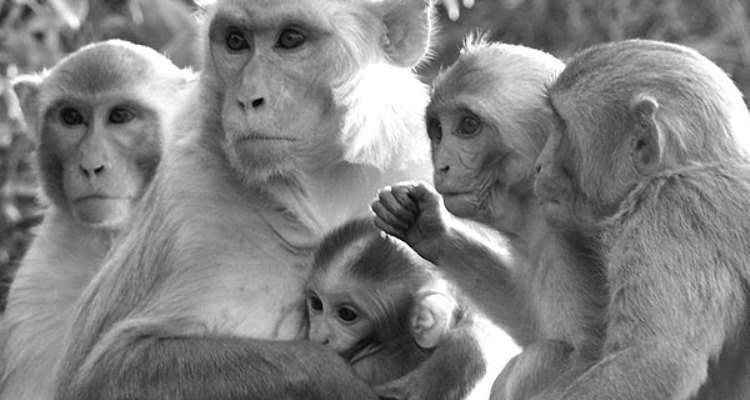Surprising monkey study finds bad times do not cause group members to change behavior

Researchers have observed an unexpected behavioral pattern in monkeys in Puerto Rico. It is known that as the population density of the group rises, the group as a whole produces fewer babies. But to the surprise of researchers, it turns out that the behavior of the group's individual members did not change. What explains this phenomenon?
During an economic crisis, society responds by spending less money and saving more. And when times get better, people start spending again. The same adjustment to shifting resources is found in animal populations: As population density fluctuates, the population will react by producing fewer or more offspring, splitting up or expanding, etc.
We probably think that such group reactions result from each individual member changing behaviors. But according to a new Danish/Puerto Rican study this is not the case. The study was conducted by Professor Raisa Hernández-Pacheco from University of Puerto Rico and Associate Professor Ulrich Steiner from University of Southern Denmark. It was published in journal The American Naturalist.
The researchers analysed 40 years of data from a monkey colony on the island Cayo Santiago in Puerto Rico. From this data, they know how many and which members of the colony actually changed reproductive behavior when the population density in the group rose or fell during this period.
"We expected to see an increase in the number of monkeys that changed behavior as a reaction to a population density rise or drop. That is, when the density is rising, [we thought] most individuals would change towards not reproducing and when the density stays high, few individuals would reproduce. In contrast, when density drops, more females would change towards successfully reproducing. But that did not happen. Instead, we saw that no more individuals changed behavior as a reaction to a density rise or a density drop, or when density was stable. There were just as many monkeys who carried on as usual and did not try a new strategy in order to respond to the density change. So the same number of monkeys were responsible for the behavioral changes and adaptations that enabled the group as a whole to adjust to the increased population density," says Ulrich Steiner.
So there is a constant proportion of group members who display behavior changes, independent of how large or small the crisis might be. Still, the population as a whole shows stronger responses to larger crises than to smaller ones. On average, 67 percent of the monkeys changed behavior as a reaction to crises, while 37 percent did not. The study also shows that it is not always the same individuals who account for the group's behavior changes.
"Next time there is a change in the monkeys' environment, there may be other individuals who react. But the proportion of individuals reacting would stay the same," says Raisa Hernández-Pacheco.
If we apply these findings to news stories about how people spend less money during an economic crisis, it does not mean that everyone spends a little less each. Rather, when the crisis hits, the ones that do not have any money in the first place cannot save much more, those that have some money might spend less, and those that have plenty of money are not obliged to change their spending. If the crisis continues, the same proportions of people would be expected to change their behavior from spending more money to less money as at the onset of the crisis, says Ulrich Steiner.
More information: Raisa Hernández-Pacheco et al. Drivers of Diversification in Individual Life Courses, The American Naturalist (2017). DOI: 10.1086/694317
Journal information: American Naturalist
Provided by University of Southern Denmark




















